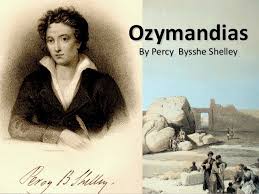Ozymandias by P.B Shelly- a mockery of human glory and power
(Percy Bysshe Shelley)
‘Ozymandias’, is a thought provoking poem written by Percy Bysshe Shelley who is considered as one of the greatest poets of English Romantic poets. He is also regarded as one of the finest lyric poets in English. He wrote radical poems on social and political issues. Ozymandias can rightly be classified under such a genre.It is a sonnet that follows the structure of the fourteen-line Italian sonnet. It is composed in iambic pentameter. It has a unique feature of an opening Octave, or a set of eight lines that presents a conflict or dilemma. It is followed by a sestet or set of six lines that offers some resolution or commentary upon the proposition introduced in the octave.
There are three characters in the poem- 1. Narrator: The poet, Shelley. He assumes the role of auditor to the tale of the traveler (line 1) and tells the reader what the traveler said.
2.Traveler: A person from an ancient land who tells his tale to the narrator.
Ozymandias: Egyptian Pharaoh who is the subject of the traveler’s tale. Ozymandias (also spelled Osymandias) is another name for one of Egypt’s most famous rulers, Ramses II (or Ramses the Great). He was born in 1314 BC and ruled Egypt for 66 years as the third king of the Nineteenth Dynasty. His exact age at death is uncertain, but it was between 90 and 99. Ramses was a warrior king and a builder of temples, statues and other monuments. He was pharaoh at the time Moses led the Israelites out of Egypt, as recounted in the second book of the Bible, Exodus (derived from the Greek word for departure).
The poem reveals the folly and vanity of human glory and power. ‘The trunkless’ legs of stone and a ‘shattered visage are the only remains of the statue of a great Egyptian Pharaoh. He wanted to immortalize himself with his statue built for him in which it was inscribed – “My name is Ozymandias, king of kings; look on my works, ye Mighty, and despair.” However nothing beside remains.
The poet tries expose the futility of human glory and power. Everything is fleeting. There is no permanent glory given to anybody. In course of nutty time, everything become oblivion. The great deeds also will disappear. The sculptor who carved the stature aptly read the emotions and attitude of the emperor. His facial expression of scorn or hostility in which the upper lip may be raised was appropriately interpreted by the sculptor.
Ozymandias wanted to show case his superiority. He wanted to establish and perpetuate his glory till posterity. However, the time has done ravage on his calculations. It is to be noted that human beings are mortals. So too the case with their ‘mighty works’. To sum up the poem unfolds the glare reality of human existence. It is an eye-opener to all those who take pride in their material possessions and deeds.


